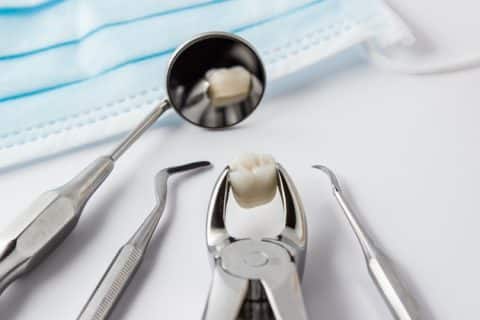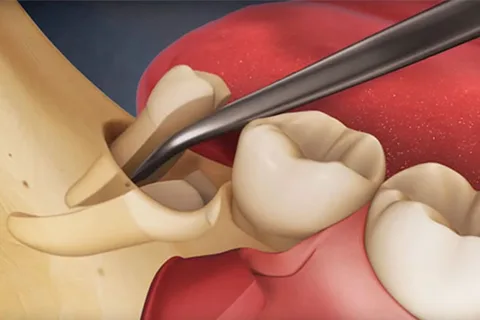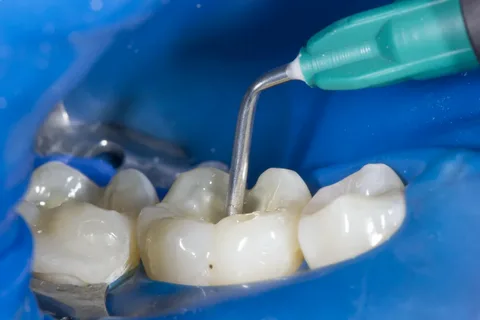TREATMENTS
Tooth Extraction Treatment in Lahore
Tooth Extraction
Tooth extraction is a dental procedure involving the removal of a tooth from its socket in the jawbone. This procedure is typically performed for various reasons, including severe decay, advanced gum disease, impacted wisdom teeth, or orthodontic considerations. The dentist uses specialized instruments to loosen and remove the tooth carefully. Tooth extraction is a common and generally safe dental procedure designed to alleviate pain, prevent further oral health issues, and promote overall dental well-being.

- Functional Impairment
- Aesthetic Concerns
- Speech Difficulties
- Preventing Tooth Migration
- Preserving Bone Health
- Improving Oral Health
- List Item #1
- List Item #2
- List Item #3
Types of Tooth Extraction

Simple Extraction
Simple extractions are performed on visible teeth that are easily accessible and can be removed without extensive surgical techniques.The dentist uses dental instruments, called elevators and forceps, to loosen and lift the tooth from its socket

Surgical Extraction
Surgical extractions are necessary for teeth that are not easily accessible or are more complex to remove. This includes impacted teeth, broken teeth below the gumline, or teeth with curved or long roots.

Vital Pulp Therapy
Vital pulp therapy may be considered in cases where the pulp is injured but not extensively infected. It involves treating the affected pulp to maintain its vitality and function.

Pulpotomy
A pulpotomy is a partial removal of the pulp, often performed on primary (baby) teeth. It involves removing the infected portion of the pulp from the crown of the tooth while leaving the pulp in the roots intact.
CAUSES OF TOOTH EXTRACTION
Tooth extraction is a dental procedure where a tooth is removed from its socket. Several reasons may warrant the need for tooth extraction, and these can be broadly categorized into two types: medical (health-related) reasons and dental (tooth-related) reasons. Here are common causes for tooth extraction.The dentist uses specialized instruments to loosen and remove the tooth carefully. Following extraction, patients may experience some discomfort and are advised on proper postoperative care, which may include pain management and avoiding certain activities
Severe Tooth Decay
Extensive decay that has damaged the tooth beyond the point of repair may necessitate extraction.
Periodontal Disease
Advanced gum disease can lead to the loss of supporting bone around the tooth, causing tooth mobility.
Impacted Wisdom Teeth
Wisdom teeth, or third molars, may become impacted (unable to fully emerge from the gum) and cause pain, infection, or damage to neighboring teeth, necessitating extraction.
Orthodontic Treatment
Some orthodontic treatments may require the extraction of one or more teeth to create space or achieve proper alignment.
TOOTH EXTRACTION
Symptoms of Tooth Extraction
- Speech Changes
- Shifting of Adjacent Teeth
- Changes in Bite Alignment
- Bone Loss
- Aesthetic Concerns
How To Take Care Missing Teeth
Taking care of your oral health, especially when you have missing teeth, is important to prevent complications and maintain overall well-being. Here are some tips on how to care for missing teeth:
Floss Regularly: Floss between your remaining natural teeth and around dental appliances to remove plaque and prevent gum disease. If you have dental bridges or implants, use floss threaders or interdental brushes for effective cleaning.
Use an Antiseptic Mouthwash: Rinse your mouth with an antiseptic or fluoride mouthwash to help control bacteria and maintain oral hygiene. Consult your dentist for recommendations based on your specific needs.
Visit Your Dentist Regularly: Schedule regular dental check-ups, even if you have missing teeth. Your dentist can monitor the health of your remaining teeth, assess your gum health, and address any concerns promptly.
Consider Dental Appliances If you have missing teeth, your dentist may recommend dental appliances such as bridges, dentures, or implants to restore function and aesthetics. Follow your dentist’s instructions for care and maintenance of these appliances.
FAQs
Tooth extraction is the removal of a tooth from its socket in the jawbone, typically performed due to various reasons such as decay, damage, or crowding.
Reasons for tooth extraction include severe decay, advanced gum disease, trauma, overcrowding, or the need to remove impacted wisdom teeth.
Tooth extraction is typically performed under local anesthesia, ensuring that patients do not feel pain during the procedure.
The duration varies, but a simple extraction may take a few minutes, while more complex extractions or multiple extractions may take longer.
The initial recovery period is a few days, during which patients are advised to follow postoperative care instructions, including rest and avoiding certain foods.
While complications are rare, they can include infection, excessive bleeding, or dry socket. Following postoperative instructions minimizes the risk.

